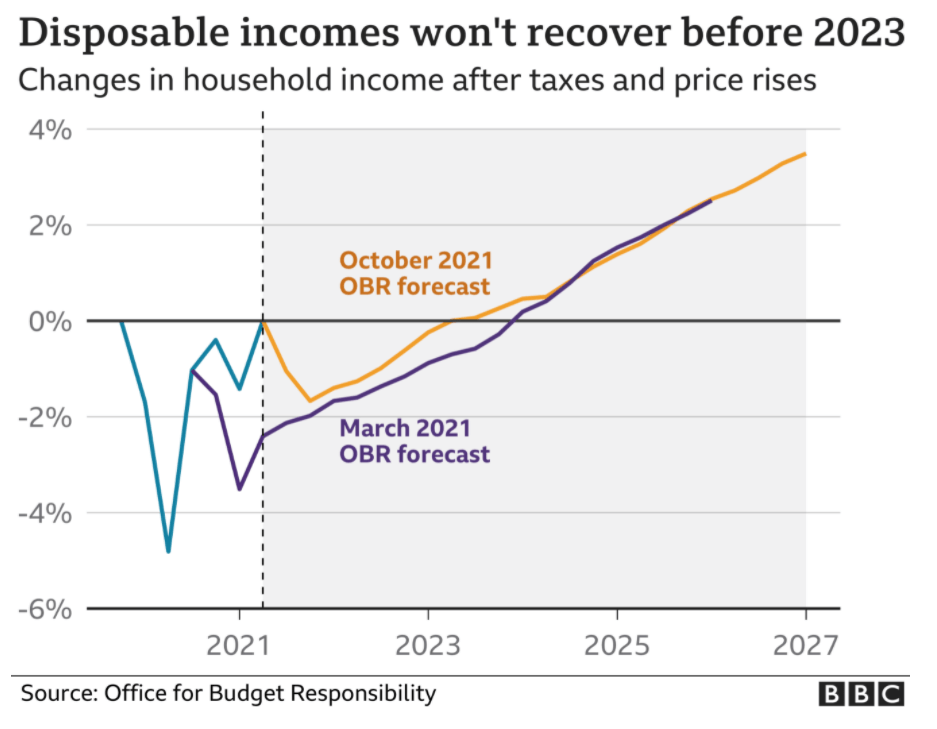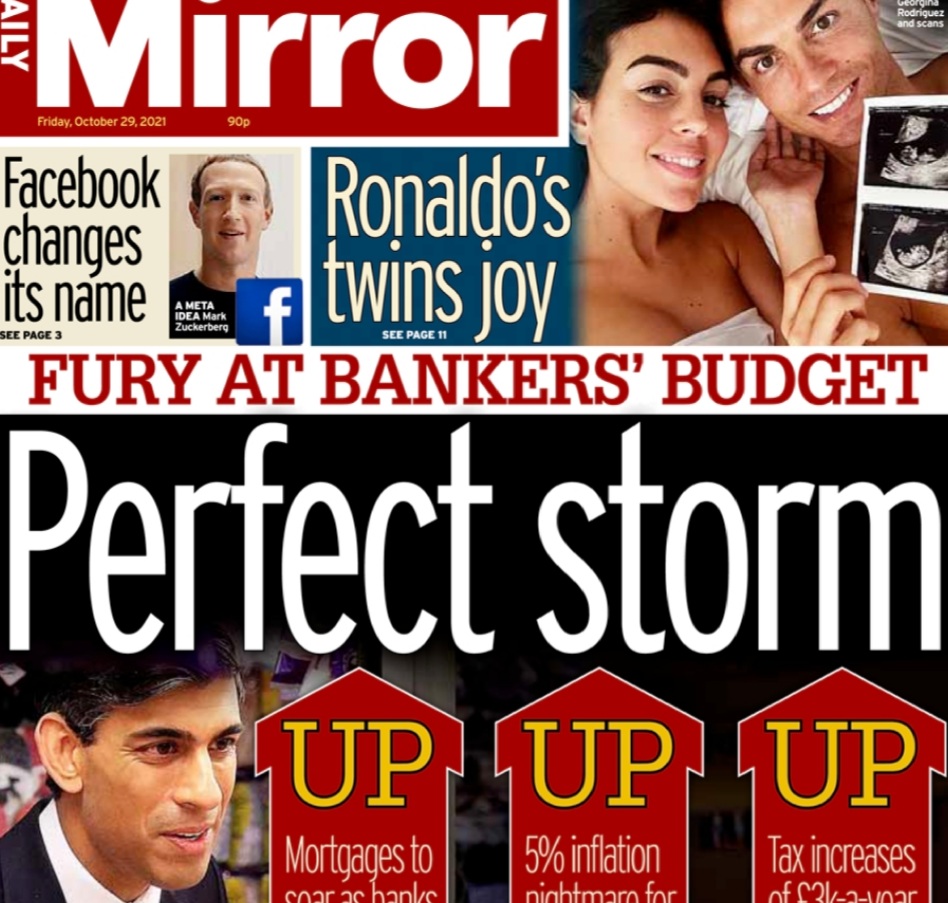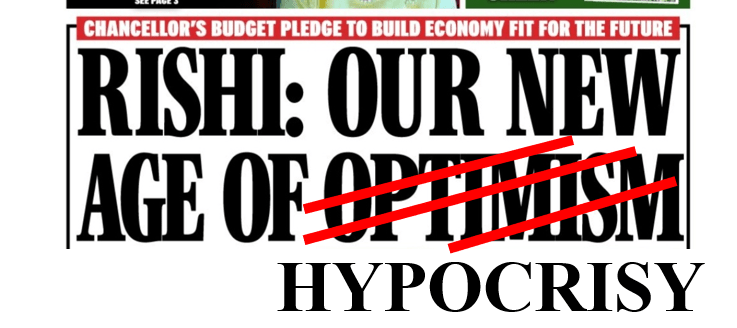By John Pickard
It is hard to work out which particular Tory LIE is the biggest. So many whoppers have been put out there, one following another in quick succession, that they have all merged into one long stream of porkies. But for ordinary workers, the lies about ‘levelling up’ and austerity being ‘over’ must rank as among the most galling.
This week’s budget has included a much trailed ‘rise’ for public sector workers and an increase in the national minimum wage to £9.50 an hour, for the over 23s. Leaving aside the strange idea that a 22-year-old apparently needs less to live on than a 23-year-old, the rise in minimum wage is from miserably low levels to not-quite-so-miserably-low. For those on low pay, taking inflation into account, the rises being proposed are no rises at all. Inflation is already around 4 per cent, with food, a proportionally larger part of the budget for the lowest paid, rising at twice that. Energy inflation, another major part of the weekly budget for the least well off, is higher again, and by a long way.
The Bank of England is now expecting inflation to reach 5 per cent, and while inflation is eating away at living standards now, the increase in minimum wage is only set to come in next April. Whichever way you look at the situation, workers in general and low paid workers in particular, are suffering a cut in their living standards.

When it comes to the freeze on public sector pay supposedly being ‘over’, it is all smoke and mirrors. Rishi Sunak has not agreed any particular rise, leaving it to pay review bodies, no doubt so he can ignore their recommendations. More to the point, local authorities have suffered massive cuts in the last decade and there are no moves to restores these cuts. It remains to be seen where the money for higher local authority wages will come from.
Meanwhile, the private sector continues to loot the NHS on an eye-watering scale – such as the £37bn allocated to a useless test and trace system – and any additional finance allegedly going to the NHS will more than likely find its way into shareholders pockets than into the pay packets of nurses or midwives.
Many will still be worse off after April
According to the Labour Party’s analysis “even if the hourly minimum wage rises to £9.50, a worker affected by the removal of the universal credit uplift, higher national insurance contributions and a freeze in income tax personal allowances, will still be £807 worse off from April — before taking into account the expected rise in gas and electricity prices next year”. (Financial Times, October 26)
Tom Waters, a senior research economist at the Institute for Fiscal Studies, a think-tank, told the Financial Times that “while this boosts earnings for full-time minimum wage workers by over £1,000 per year, those on universal credit will see their disposable income go up by just £250 because their taxes rise and benefit receipt falls as their earnings increase”.

According to the Institute for Fiscal Studies, “millions of people are set to be worse off next year amid spiralling costs and tax rises, says an economic think tank”. (BBC website, October 28). This is because, the IFS says,“higher taxes on incomes would negate small wage increases for middle earners…Low-income households will also feel “real pain” as the cost of living is set to increase faster than benefit payments”.
The outlook for livings standards doesn’t match Sunak’s upbeat tone
The press has fallen over itself to reflect the sunny optimism that Sunak and Johnson wanted to project on Wednesday, but this ‘upbeat’ message will cut no ice. As Paul Johnson, director of the IFS, said, “millions will be worse off in the short term” because of rising prices, particularly for food and energy. “Unfortunately for him [Sunak] and for us”, Paul Johnson added, “the outlook for living standards does not match this upbeat tone.”
As Christina McAnea, UNISON general secretary pointed out, Sunak’s announcements were only “designed to dazzle and impress”. It could also take attention away, she wrote on her blog, “from the national insurance rise, the cut to universal credit and a decade of damaging public sector funding squeezes, pay freezes and a ‘pay pause’ at the height of the pandemic…if the chancellor doesn’t allocate extra money to government departments to fund the much-needed wage rises, the pay freeze will continue in all but name.”

Last but not least, in the expectation of higher inflation and higher Bank of England base rates, building societies and banks have already started to put up mortgage payments, taking more money out of households. Overall, in other words, the government is appearing to give with one hand, while it is actually taking away more with the other, by reducing the Universal Credit upgrade and increasing National Insurance contributions and allowing inflation to rip. The Tories have done these tricks now for over eleven years and as any worker in the public sector will testify, actual take-home pay has fallen by the equivalent of 15-20% in those years. This budget goes nowhere to offsetting the cuts in the past.
Keir Starmer: half-a-Mars-bar Man
One odd side-effect of the raising of the national minimum wage to £9.50 an hour is to make Keir Starmer look even more ridiculous for clinging steadfastly to his support for £10 an hour. While trade union members have now gone past that, justifiably calling for a £15 an hour minimum, and Labour conference overwhelming endorsed £15. So Starmer soldiers on, even though the gap between him and the Tories is now only 50p. We shouldn’t be surprised if in the eyes of ordinary workers, Keir Starmer becomes known as “Mr half a Mars bar”.



